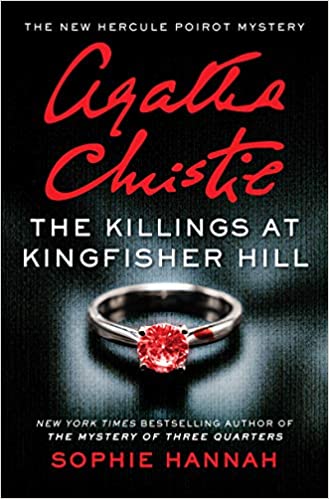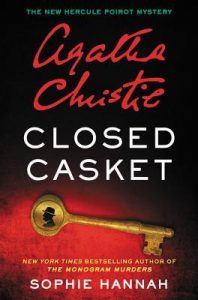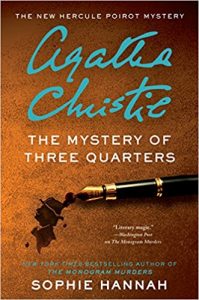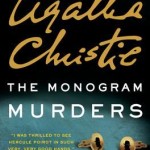 The Killings at Kingfisher Hill: The New Hercule Poirot Mystery by Sophie Hannah
The Killings at Kingfisher Hill: The New Hercule Poirot Mystery by Sophie Hannah Format: eARC
Source: supplied by publisher via Edelweiss
Formats available: hardcover, paperback, large print, ebook, audiobook
Genres: historical fiction, historical mystery
Series: New Hercule Poirot #4
Pages: 288
Published by William Morrow on September 15, 2020
Purchasing Info: Author's Website, Publisher's Website, Amazon, Barnes & Noble, Kobo, Bookshop.org
Goodreads
“I was thrilled to see Poirot in such very, very good hands.”— Gillian Flynn, New York Times bestselling author of Gone Girl
The world’s most beloved detective, Hercule Poirot—the legendary star of Agatha Christie’s Murder on the Orient Express and Death on the Nile—returns in a delectably twisty mystery.
Hercule Poirot is travelling by luxury passenger coach from London to the exclusive Kingfisher Hill estate. Richard Devonport has summoned him to prove that his fiancée, Helen, is innocent of the murder of his brother, Frank. There is one strange condition attached to this request: Poirot must conceal his true reason for being there from the rest of the Devonport family.
On the coach, a distressed woman leaps up, demanding to disembark. She insists that if she stays in her seat, she will be murdered. A seat-swap is arranged, and the rest of the journey passes without incident. But Poirot has a bad feeling about it, and his fears are later confirmed when a body is discovered in the Devonports' home with a note that refers to ‘the seat that you shouldn’t have sat in’.
Could this new murder and the peculiar incident on the coach be clues to solving the mystery of who killed Frank Devonport? And can Poirot find the real murderer in time to save an innocent woman from the gallows?
My Review:
 This is the 4th book in the New Hercule Poirot mystery series, and I have to say that the longer this new Poirot series goes on, the more I sympathize with Inspector Edward Catchpool.
This is the 4th book in the New Hercule Poirot mystery series, and I have to say that the longer this new Poirot series goes on, the more I sympathize with Inspector Edward Catchpool.
Not that there were many sympathetic characters in this particular entry in the series. Not even Poirot. And that’s not a good thing for a story where he is the main character.
Not that a book can’t have a frustrating or unappealing central character, but that’s not who or what Poirot is supposed to be. His quirks – his many, many quirks – are supposed to be familiar and endearing. And they usually are.
I say this as someone whose enduring memories of Poirot are from the portrayal by David Suchet and not from Christie’s original work, of which I’ve read a few but not exhaustively. It’s Suchet’s portrait of the little Belgian detective as a quirky genius that sticks in the mind. Not just for the stories and the settings, which were marvelous, but for the twinkle in the eye that his Poirot seemed to have, particularly when his idiosyncrasies were otherwise at their most annoying.
It’s something I’ve seen in the previous books in this series, and I certainly heard Suchet’s voice uttering many of Poirot’s lines in the earlier books. But this time the illusion fell apart.
 The device for these new stories is that Poirot has taken on the role of mentor to a young Scotland Yard detective, Inspector Edward Catchpool. It’s very different from the role he occupied in regards to his original partners in either the books or the TV series, Captain Hastings, Miss Lemon, and Inspector Japp. While none of those mentioned had nearly Poirot’s genius, they all seemed to be his contemporaries in age, giving those relationships some level of equality that the young Catchpool cannot aspire to.
The device for these new stories is that Poirot has taken on the role of mentor to a young Scotland Yard detective, Inspector Edward Catchpool. It’s very different from the role he occupied in regards to his original partners in either the books or the TV series, Captain Hastings, Miss Lemon, and Inspector Japp. While none of those mentioned had nearly Poirot’s genius, they all seemed to be his contemporaries in age, giving those relationships some level of equality that the young Catchpool cannot aspire to.
And this is a case where Poirot is at his most mysterious and impenetrable, deriding Catchpool at every turn while withholding the information that the man needs to even begin to figure out what is going on. The scene where Catchpool is freezing in a swimming pool while Poirot insists that he make his report before permitting him to get out of the pool and dry off, meanwhile telling Catchpool how stupid he is to be swimming in the first place seemed a bridge too far for even Poirot’s insensitivity to anything but the processes of his “little grey cells”.
It does not help that in this particular mystery, none of the potential murderers are remotely sympathetic – and most of their motives and actions don’t make nearly enough sense. They’re not quite as terrible as the Thrombey family in Knives Out, but they’re not far off that mark, either.
And the Thrombey family, as hateful as they were, generally had motives that were both clear and comprehendible. Reprehensible, but understandable. That didn’t feel true in this story. It wasn’t just that I didn’t like the suspects, as that the reasons they acted as they did just did not ring true.
 The rich may be different than you and me, and the past may be another country where they do things differently, but human beings are just not this different.
The rich may be different than you and me, and the past may be another country where they do things differently, but human beings are just not this different.
Escape Rating C: This may be a “fair play” mystery, where the reader has all of the same clues as the detective, but it felt like neither fair nor play. The only character I felt for, or who felt like a plausible human being, was the much-put-upon Catchpool, who is all too aware of the situation that he has been placed in, caught between his superintendent’s belief in Poirot’s detective genius and Poirot’s need to expound that genius at someone he believes needs his expert guidance. Not that Catchpool doesn’t need seasoning and experience, but all I did in this outing was feel sorry for him.
Obviously, this was not my favorite in this series. I found the others charming and comforting, reading like continuations of the TV series. I enjoyed them enough that I’ll be back for the next in the series in the hopes that it returns to its original form.

















